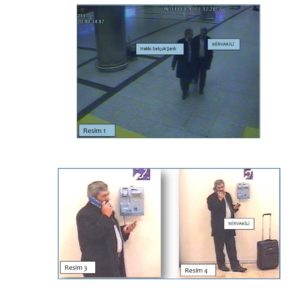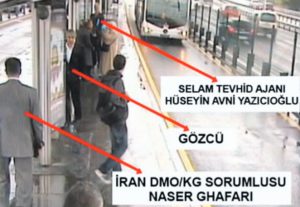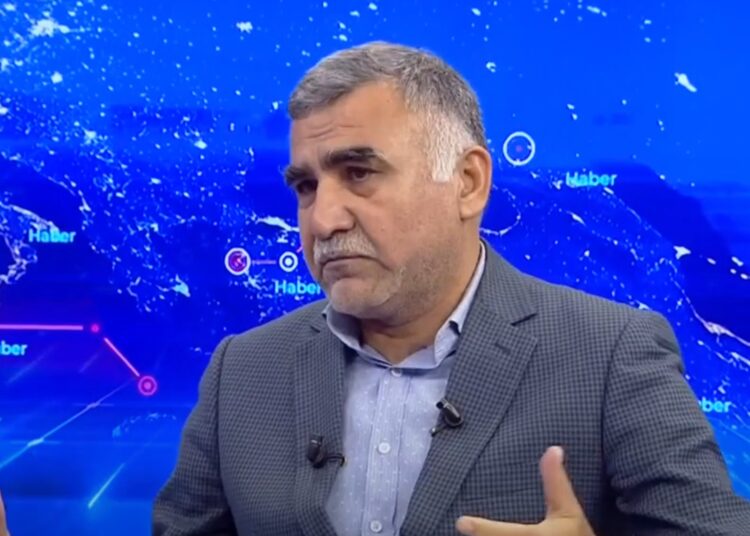Abdullah Bozkurt/Stockholm
The pro-Iran Islamist government of President Recep Tayyip Erdogan struck a secret deal to dismiss all charges against a Turkish operative who had long served as a liaison for the IRGC Quds Force in Tehran, providing logistical support to the terrorist group’s Turkish affiliate and facilitating training in arms and explosives.
Ali Akbulut (also known as Mehmet), a 56-year-old Turk who had been on INTERPOL’s Red List for terrorism charges and lived as a fugitive in Tehran for two decades under the protection of the mullah regime, was quietly permitted by the Erdogan government to return to Turkey, where a court hearing led to his acquittal and that of several of his associates on all charges related to the Quds Force terrorism case.
He resettled in Turkey to continue doing the bidding of the Quds Force and has since become one of the chief instigators in anti-Israel campaigns, frequently appearing on national television as a commentator and invited to speak at antisemitic gatherings.
The investigation file on Akbulut, obtained by Nordic Monitor, reveals that he was the initial point of contact in Tehran for new recruits arriving from Turkey to join the Quds Force’s military training, which included instruction in the use of arms, explosives and surveillance techniques. Multiple suspects later convicted in the Quds Force’s Turkish network, known as the Selam Tevhid group, testified that they were directed to contact Akbulut upon their arrival in Tehran, where they were hosted at his home before being transferred to the Quds Force training compound.
According to the indictment filed in July 2000 against Quds Force members by the Office of the Chief Prosecutor at Ankara’s State Security Court, Yusuf Karakuş, a convicted member of the Quds Force, detailed in his statement how he traveled to Iran twice, met with Akbulut in Tehran and was subsequently taken to a religious figure known as Ayatullah Mohammad for indoctrination before being moved to a safe house for days of military training and political lectures.
He was later transported to a site in the Iranian city of Qom, where Quds Force commanders trained him and other Turks in the group on the use of various types of firearms and explosives.
Excerpts from the statement of Yusuf Karakuş, a convicted member of the Quds Force, who identified Ali Akbulut as a key contact in Tehran, noting that Akbulut facilitated their military training in arms and explosives:
Karakuş’s statement was further corroborated by Muzaffer Dağdeviren, another convicted felon recruited by the Quds Force for an assassination plot against Turkish-Jewish businessman Jack Kamhi and the kidnapping of Iranian dissident Abbas Gulamzade. Dağdeviren testified that Akbulut introduced him and others in the group to Quds Force members in Tehran during their visit, which also involved arms training.
Fatih Aydın, who was also part of the same group as Dağdeviren during their 1992 trip to Iran, corroborated these accounts in his statement.
“In 1992, three of us went to Iran. Mehmet Akbulut met us and took us to his home. At the house, Abdulhamit Çelik [Turkish national and member of the Quds Force] was also present, and we stayed there for one night. The next day, the Iranians took us to a villa. Here, they started giving us lessons in intelligence work, surveillance and theoretical information. Later, they began teaching us about weapons. They provided theoretical information on disassembling and reassembling various weapons such as the G-3, Kalashnikov, Beretta, Uzi and other firearms of different calibers and brands, as well as on their firing mechanisms. Additionally, we went to a field for live-fire training.”

“Afterward, we went to a military barracks near Tehran for training in explosive materials. A young man, whom we addressed as Ali, began instructing us on bomb-making. We received training on making bombs with C-4 explosives, TNT and similar materials. After staying there for about a week, we returned to the villa. We continued weapons training for about another week,” he added. After their training was completed, the Iranians gave them money and helped them cross the border to Turkey.
Mehmet Ali Tekin, another convicted member of the Quds Force terrorist group in Turkey, identified Akbulut as a key point of contact during his multiple trips to Tehran. In addition to Turkey, Tekin was also active in Russia, Germany and Afghanistan as part of assignments given to him by his Quds Force handlers.
Iran provided refuge for Akbulut for two decades, even offering him a cover position as a reporter for the state-run Iranian radio’s Turkish service. However, his actual role was to remain a key operative in the Quds Force’s Turkish operations.
Document from Turkey’s Security Directorate General (Emniyet) indicates that an INTERPOL Red Notice was issued for Ali Akbulut on terrorism charges:
In fact, during a renewed terrorism investigation into the Quds Force network in Turkey in 2011, public prosecutors flagged Akbulut again as a suspect for ongoing criminal activities on behalf of the Quds Force. He was found to be in contact with numerous suspects in the case, as evidenced by intercepted phone calls recorded by the police while executing wiretap warrants issued by judges overseeing the Quds Force probe.
The new case file included 61 wiretaps in which Akbulut conversed with other suspects, revealing the scope and extent of Quds Force operations in Turkey and exposing its clandestine methods. Police intelligence reports from April and May 2011 disclosed that Akbulut was transferring money from Iran to other Quds Force members in Turkey using the hawala system, bypassing traditional banking transactions due to US financial sanctions on Iran and utilizing jewelry stores and currency exchange houses in Istanbul.
The investigation, which continued until 2014, identified 242 suspects, including both Turkish and Iranian nationals, some of whom were working for the Iranian Consulate in Istanbul, as being involved with the Quds Force. Akbulut was among those listed as suspects by prosecutors. He was found to be coordinating trips for potential new recruits, who were invited to visit Iran on the pretext of academic studies, sightseeing and other cover projects.
The police compiled overwhelming evidence in the case file, including surveillance records, phone and email wiretaps, banking transactions, intercepted documents, travel records and other material evidence. The file detailed how the Quds Force gathered intelligence in Turkey, recruited new members, developed intelligence assets and provided logistics and funding.
It also included specifics on planned attacks, such as a bombing near the Israeli Consulate in Istanbul, surveillance of a nuclear research facility, attempts to obtain classified information and an intended attack on the US Consulate General in Istanbul.
Police intelligence reports revealed that the Quds Force transferred funds to Turkey through Ali Akbulut using the hawala system:
However, the case was derailed in February 2014 when the Erdogan government intervened: The investigating prosecutor was dismissed, and the police chiefs managing the investigation were reassigned. Irfan Fidan, a loyalist appointed as the new prosecutor, dropped all charges and terminated the investigation. In recognition of his service, Erdogan promoted Fidan to chief public prosecutor in Istanbul and later appointed him as a judge on the Constitutional Court.
Meanwhile, Akbulut remained a fugitive, with a still-outstanding arrest warrant issued for him by the Ankara 11th High Criminal Court in the 2000 case.
However, in a highly unusual move in 2020, the Ankara 5th High Criminal Court quietly removed the arrest warrants for Akbulut and three other fugitives—Selahattin Eş, Aydın Koral and Ahmet Cansız—allowing them to return to Turkey and defend themselves against the charges.
This suggests that a secret arrangement was made in advance to ensure that they would not be arrested at the border upon their return. Instead, they were allowed to enter the country and attend court hearings. This was highly unusual and deviated significantly from established procedures for executing outstanding warrants, indicating that they had received special treatment.

At the hearing on October 20, 2020 the suspects denied the charges. In a subsequent hearing on December 8, 2020, the panel of judges moved to acquit Akbulut, Koral and Eş, asserting that they had traveled to Iran to freely practice their faith and that there was insufficient evidence of criminal activity. The ruling disregarded the substantial body of evidence gathered by law enforcement agencies over two decades.
“The defendants carried out their activities in Iran within the framework of their freedom of religion, conscience, thought and expression. They met with and accompanied individuals whose worldview or sentiments were similar to theirs during these individuals’ visits to Iran. They also accompanied them to various religious sites, individuals or shrines,” the ruling stated. The court further claimed that Akbulut did not know that the people who visited him in Tehran were connected to Quds Force Turkish affiliate Selam Tevhid.
It is evident that the court’s decision to acquit Akbulut and the others was influenced by the Erdogan government, which exerts total control over the Turkish judiciary, compromising its independence and impartiality. The Erdogan administration has weaponized the criminal justice system in Turkey, harshly punishing critics and opponents while allowing criminal figures with similar ideological affinities to operate with impunity.












